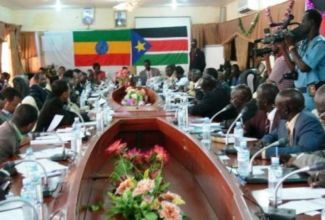Ethiopia, South Sudan regional cooperation consultation begins in Juba
By Tesfa-alem Teckle
July22, 2009 (ADDIS ABABA) — The second Ethiopia and South Sudan regional cooperation consultation is under way in the southern Sudanese capital, Juba.

During the 3-day meeting regional officials will evaluate setbacks faced along the road and will put directions that would best tackle the challenges they faced in implementing past agreements.
They are also expected to design better ways that further would empower strong sides grasped and accepted in both minds.
On the opening of the meeting on Tuesday, Ethiopia’s deputy foreign minister Dr.Tekeda Alemu, who led the Ethiopian delegation reaffirmed Southern Sudanese officials that Ethiopia will remain dedicated to heighten its roles that benefit the two brotherly people.
Dr. Tekeda further assured that his government is ready to implement recommendations coming out of the meeting.
Sudanese officials to their side hailed Ethiopia’s tremendous efforts in bringing lasting peace and stability in Sudan and to its overall contribution in the rehabilitation and development activities of south Sudan.
The southern Sudanese officials called on Ethiopia to keep on its positive contribution for the success of the ongoing construction of infrastructures and public services in south Sudan
Ethiopia, Sudan regional cooperation was first initiated after southern Sudanese president and Sudanese vice president paid a visit to Ethiopia’s capital, Addis Ababa two years ago.
The joint regional cooperation has executed a number of duties and solved major regional problems through mutual understanding and cooperation.
Following their first meeting in Addis Ababa last year, Roads that link south Sudan to three Ethiopian regions are constructed; communities living along the common border have become beneficiaries of education, health facilities, electricity and trade among others.
Similarly pastoralists of both countries, along the border, have then after began enjoying common natural resources to their livestock’s based on mutual understanding and peacefully.
(ST)
